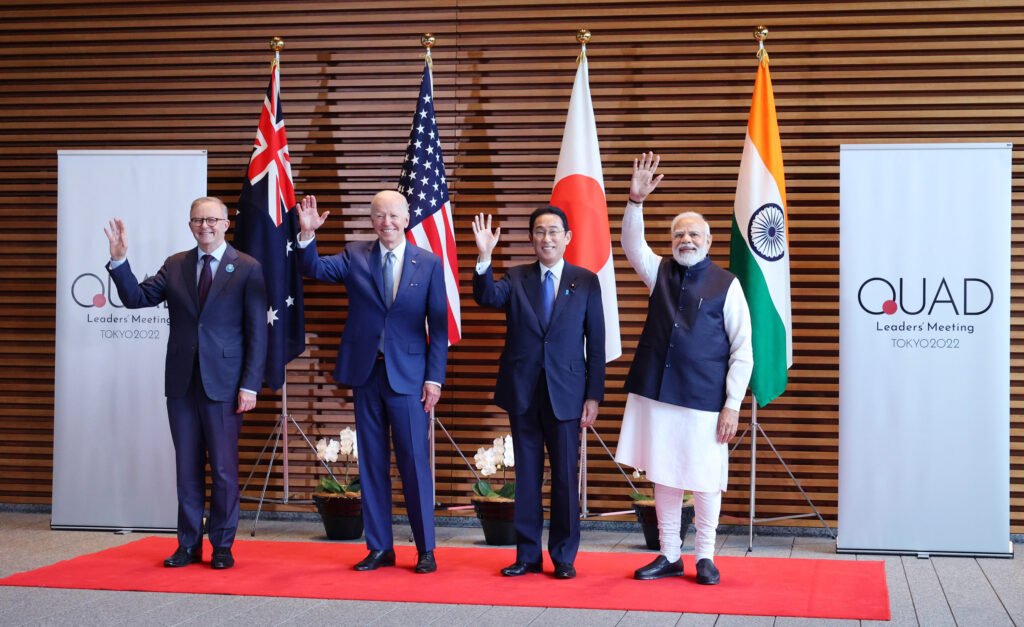In a world increasingly defined by strategic alliances and geopolitical tensions, the Quad Summit hosted by President Joe Biden in Wilmington, Delaware, marks a significant chapter in the narrative of international relations. With Prime Minister Narendra Modi of India, alongside leaders from Australia, Japan, and the United States, this summit wasn’t just a meeting of nations; it was a convergence of visions for the Indo-Pacific and beyond.
The Setting: Biden’s Delaware
Choosing his hometown for this summit, President Biden set a personal tone for a gathering that many view as a cornerstone of diplomacy aimed at fostering peace, stability, and prosperity in a region crucial for global commerce and security. The choice of venue underscored Biden’s commitment to deepening relations with Quad partners, reflecting a blend of diplomatic strategy with personal diplomacy.
Strategic Dialogues and Outcomes
The summit’s agenda was both broad and deep, touching on maritime security, economic cooperation, technology sharing, and climate initiatives. Here’s what unfolded:
- Maritime Security: Central to the discussions was the expansion of the Indo-Pacific Partnership for Maritime Domain Awareness initiative to include the Indian Ocean. This move aims to counterbalance China’s assertiveness in maritime domains, particularly in the South China Sea, where territorial disputes remain a flashpoint. The Quad’s emphasis on maritime security underscores its strategic importance, positioning the group as a maritime dialogue committed to a rules-based maritime order.
- Economic and Technological Cooperation: Amidst discussions, there was a significant focus on economic frameworks like the Indo-Pacific Economic Framework for Prosperity, which seeks to enhance supply chain resilience, infrastructure development, and technology transfers. The leaders announced plans for a Memorandum of Cooperation between their export credit agencies, aiming to bolster trade financing and technological exports, particularly in critical technologies like AI, quantum computing, and semiconductors.
- Climate and Environment: Building on previous commitments, the summit touched on climate resilience, with a particular emphasis on initiatives like QIPORA (Quad Initiative for Pro-Resilience in the Ocean), aimed at enhancing oceanographic research and cooperation for climate change mitigation.
- Health and Humanity: A notable announcement related to Biden’s Cancer Moonshot Initiative, aiming to reduce cancer deaths, highlighted the Quad’s commitment to non-traditional security threats like health pandemics, aligning with broader global health security goals.
India’s Role and PM Modi’s Vision
Prime Minister Modi’s participation was pivotal. His vision for India as a leading voice in global dialogues was evident, emphasizing a strategic autonomy that seeks to balance between major powers while advocating for a multipolar world order. Modi’s engagements, including a planned address at the UN General Assembly, underscore India’s nuanced diplomacy where it positions itself as a key player in south-south cooperation while enhancing strategic ties with democracies.
Global Implications
The Quad Summit 2024 isn’t just about immediate strategic or economic cooperation; it’s a statement on the future of international relations. With China’s rise as a backdrop, the Quad represents a coalition that, while not explicitly aimed at containment, seeks to foster an inclusive, resilient, and open Indo-Pacific. This approach reflects a broader Western strategy to engage with Asia, balancing economic interdependence with strategic autonomy.
Looking Ahead
As the leaders dispersed, the outcomes of the summit will ripple through global politics. For the Quad members, it’s about deepening their strategic partnership, setting precedents for cooperation in a volatile world. For others, especially nations in the Indo-Pacific, it’s a signal of where the winds of global power dynamics might be shifting.
The Quad Summit in 2024, therefore, wasn’t just a diplomatic event; it was a strategic narrative being written in real-time, with implications for global security, economics, and the very nature of international alliances in the 21st century.
